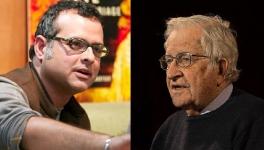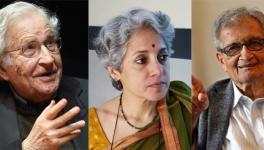Noam Chomsky: Postmodernism is an Instrument of Power
Noam Chomsky is an American linguist, philosopher, cognitive scientist, historian, social critic, and political activist. He is Institute Professor Emeritus at the Massachusetts Institute of Technology (MIT). In this interview he talks about postmodernism, how it is an instrument of power and why academics embrace it.
Transcript
But if you look at the phenomena as a whole, I think the effect is pretty clear. It allows people to take a very radical stance, you know, “more radical than thou”, but to be completely dissociated from anything that is happening. For many reasons. One reason is, nobody can understand a word they're saying. So they're already dissociated. It's kind of like a private lingo, and there is a lot of material reward that comes from it. Like, if you're part of that system, you can run around the conferences, and get big professorships and all this kind of stuff. So there's a lot of conventional material reward, and it has this very radical look to it.
Well, let me just give you an example.
I gave a talk a last Saturday at Birzeit University, the Palestinian University at the West Bank. And it was a, you know, like everywhere, big-mass-audience, political talk. Mostly criticizing the Palestinian Authority because I was in, you know, I always tell people what they do not want to hear. So when I criticize Israel I do it on the other side of the border. And most of the audience, you know, very supportive and they liked and they understood it. The guys with the jackets and ties were pretty angry, but that's normal.
However, as I left with an Arab friend of mine who organized it, actually he's an Israeli Arab, a member of the Knesset (Parliament), but an old kind of good guy, he was sitting in the back, as we walked out he kind of laughed and he told me... He said most of the especially younger people liked it a lot, but he heard one critical, really critical comment from a young woman faculty member who sort of liked the general political thrust of it, but told him it was very naïve. And I said, why was it naïve, and he laughed and he said, well it's because you said that people do things on moral grounds and you talked about truth. And that's old-fashioned nonsense, you know, that's kind of this old enlightenment stuff. We know perfectly well that nobody does it.
I mean, I talked about how apartheid was overthrown. How it was necessary to have splits inside the white society, which there were. Had the white society been unified, they would have smashed the ANC. But there were splits from the inside and basically on moral grounds people didn't want to tolerate... that was quite important. I talked about that. Well that's naïve, because nobody does anything on moral grounds. All power plays, you know, read Foucault and so on and so forth if you can understand it. And truth is kind of like an old-fashioned concept, you know, there's no truth and so on and so forth. Yeah, that stuff goes on all over.
The next day I gave a talk at an Israeli University, and then I was critical of Israel and United States, and I talked about Palestinians. And there were commentators and one of the commentators was the Dean. And, you know, he hated it of course. [He's] a historian and he also said it was naive, because I was talking as if there is objectivity in history. I was running through the history of what happened and saying how you should interpret what's going on now in those terms. It is completely naïve and everybody knows there's no objectivity and there's no truth and it's this narrative and that narrative and so on and so forth.
That's very convenient. It sounds very radical, you know, and it's extremely convenient. You can beat people over the head with perfect self-confidence because there's no reality anyway and it's just their narrative and your narrative.
In the third world it's particularly grotesque in my opinion. It's bad enough here, I don't like it here or other rich countries. But when you get to third-world countries it's really grotesque. Because there the separation of the radical intelligentsia from popular struggle shows much more dramatically. I mean, people are much poorer and they're suffering much more and these guys are usually pretty very rich in fact often. And it's ugly.
But I think it has served the function. I don't want to say that the people who are involved in it necessarily do it for this reason. In fact I know extremely good people who are very active and I respect and like and so on who are right in this stuff. I don't know why, but it means something to them. But as a general phenomenon I think that's the way it has worked. It has worked as a way of insulating sectors of a kind of radical intelligentsia from popular movements and actual activism, and it served as an instrument of power.
I think, I suspect, that's the reason why it's so readily tolerated in the Universities. I mean, it's all over the place, in the third world as well, you know, because of the function it serves.
Disclaimer: The views expressed here are the author's personal views, and do not necessarily represent the views of Newsclick. Please note that transcripts for Newsclick are typed from a recording of the program. Newsclick cannot guarantee their complete accuracy.
Get the latest reports & analysis with people's perspective on Protests, movements & deep analytical videos, discussions of the current affairs in your Telegram app. Subscribe to NewsClick's Telegram channel & get Real-Time updates on stories, as they get published on our website.
























